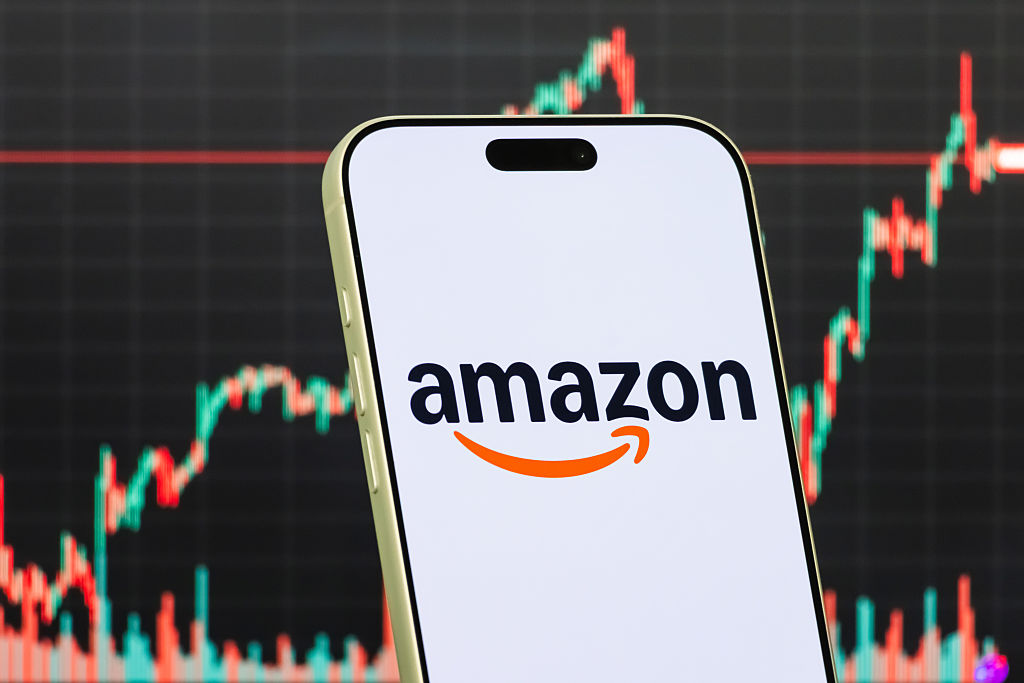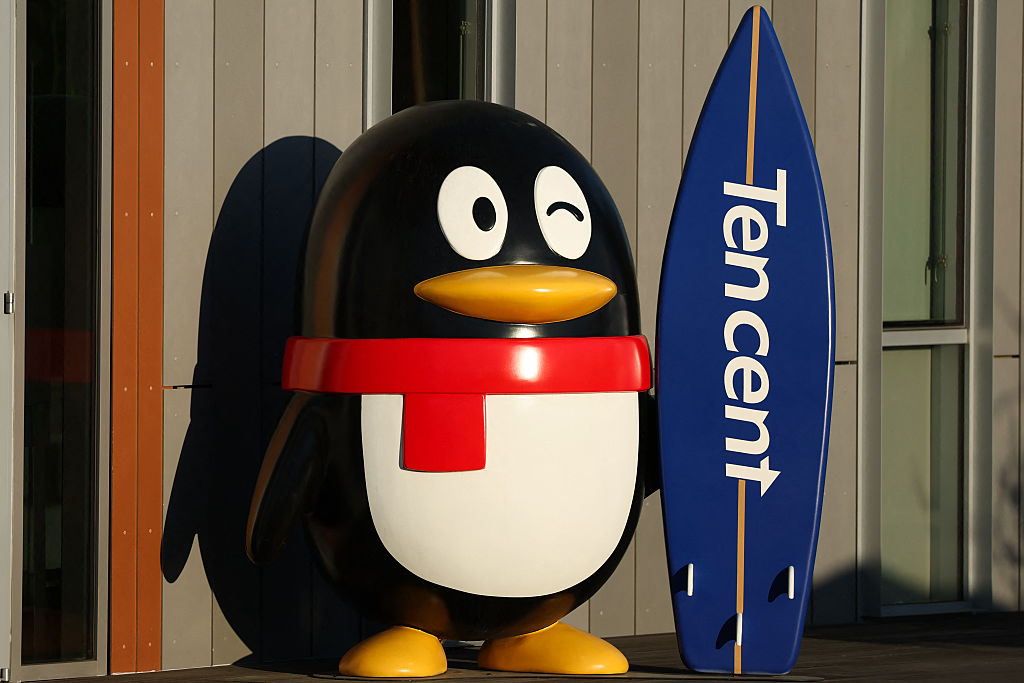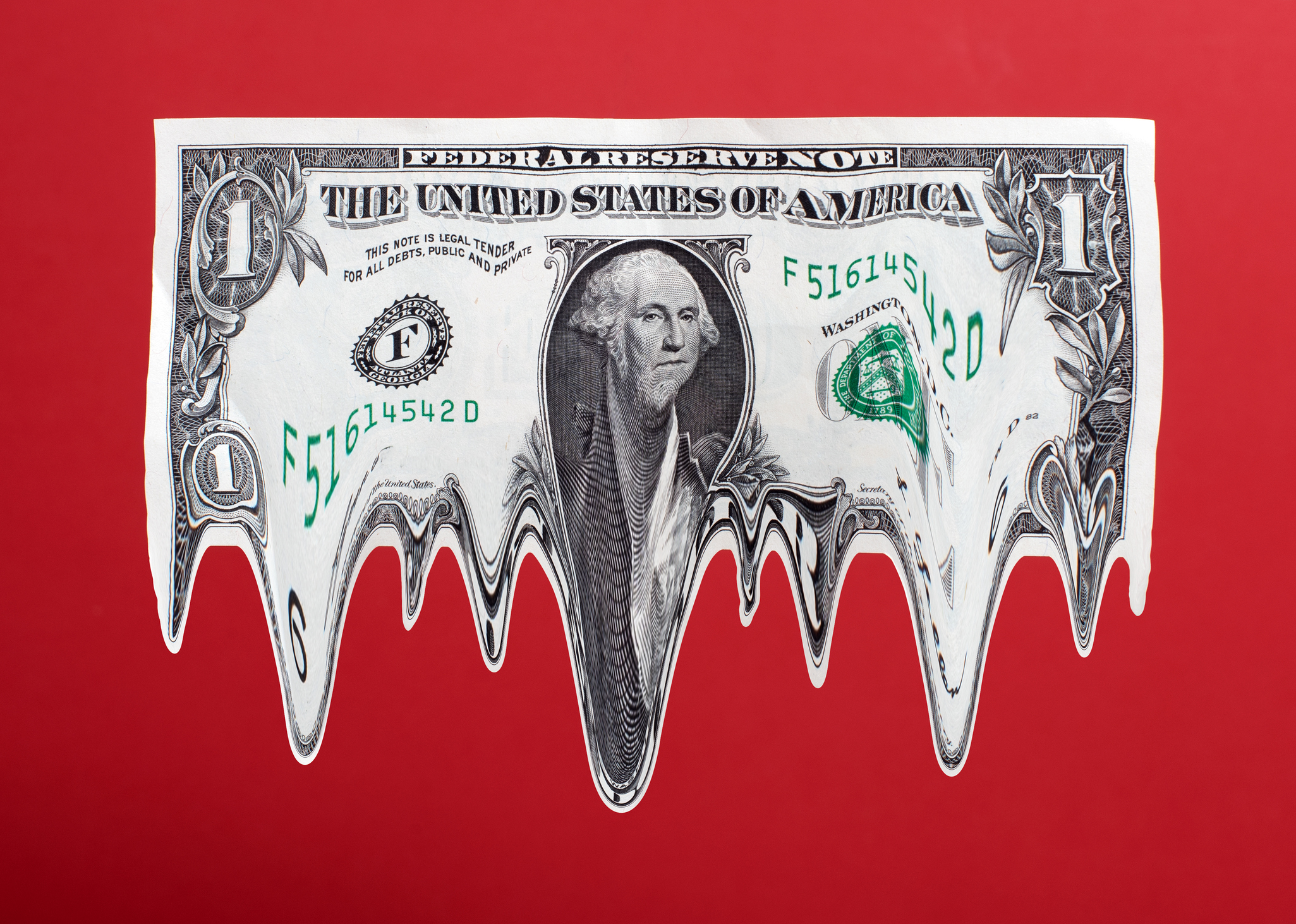Amazon shares fall on profitability concerns
A big increase in capital spending plans compounded an earnings miss for Amazon following its Q4 results


Get the latest financial news, insights and expert analysis from our award-winning MoneyWeek team, to help you understand what really matters when it comes to your finances.
You are now subscribed
Your newsletter sign-up was successful
Want to add more newsletters?
Shares in Amazon fell 5.6% on Friday 6 February following plans to substantially increase its capital expenditure (capex) over the coming year.
Magnificent Seven earnings season is almost finished, with six of the seven companies having announced their results for the fourth quarter (Q4) of the 2025 calendar year.
Amazon was the last of the six to announce its results, after markets closed on Thursday 5 February. Despite beating analyst expectations on revenue, Amazon’s stock fell following the announcement as investors baulked at the scale of its spending plans and a slight miss on profits.
MoneyWeek
Subscribe to MoneyWeek today and get your first six magazine issues absolutely FREE

Sign up to Money Morning
Don't miss the latest investment and personal finances news, market analysis, plus money-saving tips with our free twice-daily newsletter
Don't miss the latest investment and personal finances news, market analysis, plus money-saving tips with our free twice-daily newsletter
Since the launch of ChatGPT just over three years ago, the ‘Magnificent Seven’ stocks – (NASDAQ:GOOGL) , Amazon (NASDAQ:AMZN), Apple (NASDAQ:AAPL), Meta (NASDAQ:META), Microsoft (NASDAQ:MSFT), Nvidia (NASDAQ:NVDA) and Tesla (NASDAQ:TSLA) – have led the stock market.
These seven big tech stocks are among the biggest potential winners from advancing artificial intelligence (AI) technology and have been investor favourites for much of the ensuing period.
At the start of 2023, the seven tech companies collectively comprised approximately 20% of the S&P 500 between them. Now, they make up more than a third (33.5%) of the index.
Given their weighting in arguably the world’s most important stock market index, the Magnificent Seven’s fortunes have a knock-on effect on global stock market sentiment. As such, their quarterly earnings numbers are box office events that are watched carefully by investors the world over.
While there is considerable hype around these stocks, their earnings growth has tended to back it up.
“A number of the companies in the Magnificent Seven have been top contributors to year-over-year earnings growth for the S&P 500 in recent quarters,” said John Butters, senior earnings analyst at market research platform FactSet.
Magnificent Seven results and expectations
Below are the expectations in terms of revenue and earnings per share (EPS) for each of the Magnificent Seven companies yet to release their results for the last quarter of the 2025 calendar year, as well as the results for those companies that have already reported earnings.
In some cases, share price movements following the results are more linked to the broader narrative and management’s response to analysts’ questions than the fundamentals in the earnings release – which, after all, reflect the past rather than the future.
Alphabet
Shares in Alphabet opened 6.2% lower on the morning of Thursday 5 February despite reporting above-expected Q4 2025 earnings and revenue the previous evening.
GOOGL | Expected | Reported | Year-over-year change |
EPS | $2.64 | $2.82 | 31.2% |
Revenue | $111.3 billion | $113.8 billion | 18% |
Expected figures based on analysts polled by FactSet.
This was largely due to Alphabet raising its capex estimates for the year to $175 billion - $185 billion, up from $91.4 billion in the previous financial year.
“Alphabet has stunned the world with a capex spending plan of as much as $185 billion this year, 55% more than expected,” said Jim Reid, global head of macro research at Deutsche Bank. “With tech in a current state of flux it's not clear whether that's a good or a bad thing. Alphabet has been the brightest star in the tech space in the last six months so this is a big story for markets.”
Alphabet was the top performer among the Magnificent Seven stocks during 2025, gaining 66% throughout the year. One of the major factors that boosted investor sentiment was a favourable outcome in a US antitrust case which many worried would lead to a forced sale of Google Chrome.
Amazon
Shares in Amazon opened 9.0% lower on the morning of 6 February following its earnings release, which revealed a slight miss on earnings per share as well as a big rise in capex plans.
AMZN | Expected | Reported | Year-over-year change |
EPS | $1.96 | $1.95 | 4.8% |
Revenue | $211.4 billion | $213.4 billion | 13.6% |
Expected figures based on analysts polled by FactSet.
Amazon announced that it plans to invest around $200 billion into AI, chips, robotics and low earth orbit satellites in 2026, up from capex of $131 billion in the previous year.
Amazon followed in the footsteps of its CSP peers and substantially raised its anticipated capex spending intensity with the company guiding to over $200 billion in expected investment in 2026 (up over 50%),” said Matt Bryson, managing director, equity research at Wedbush Securities. “Higher spending levels are aimed primarily at supporting increased data centre requirements including both faster growth in core computing services as well as new AI workloads.”
The market reaction, though, suggests that global investors are concerned about the impact that Amazon’s big spending plans are having on its profitability.
Apple
Apple announced its results for the first quarter of its 2026 financial year (covering the three months to December 2025) on Thursday 29 January after US markets closed.
Apple beat expectations on earnings and revenue; iPhone sales registered their best-ever quarter, rising 23% year-over-year to $85.3 billion, driven by strong iPhone 17 demand particularly in China.
AAPL | Expected | Reported | Year-over-year change |
EPS | $2.67 | $2.84 | 18.3% |
Revenue | $138.4 billion | $143.8 billion | 15.7% |
Expected figures based on analysts polled by FactSet.
“Apple has been behind the curve on its AI spending spree, yet the features installed in the iPhones so far were still enough of a draw to help bring in record revenues for handset sales around the world,” said Susannah Streeter, chief investment strategist at Wealth Club.
Apple shares gained in after-hours trading on Thursday, finishing extended trading around 0.6% up on their close price having gained as much as 3.9% immediately after markets closed.
But the stock opened pre-market trading on 30 January slightly below the previous day’s close, and slipped further from there, having fallen 0.8% overnight as of 11am GMT. Reports that Donald Trump favours monetary hawk Kevin Warsh as the next Federal Reserve chair dampened US stocks.
Meta
Meta announced its Q4 2025 results after US markets close on Wednesday 28 January.
EPS increased 11% year-over-year to $8.88.
META | Expected | Reported | Year-over-year change |
EPS | $8.21 | $8.88 | 11% |
Revenue | $58.4 billion | $59.9 billion | 20.6% |
Expected figures based on analysts polled by FactSet.
Meta’s shares were trading 8.1% higher in pre-market trading on the morning after its earnings announcement. While investors were impressed by the headline numbers, it seems that the vision for Meta’s progress in AI was the most eye-catching part of the announcement.
“Meta is assembling one of the largest AI compute clusters outside the cloud giants, all aimed at strengthening its family of apps,” said Matt Britzman, senior equity analyst at Hargreaves Lansdown.
Investors have shown caution towards Meta’s shares in recent months, following large capex spend and slightly underwhelming end product in its latest AI models.
“But that’s not quite the full picture,” said Britzman. “Meta’s models are internally focused and built to enhance engagement and advertiser performance, rather than top benchmarks, and the benefits are already working through to the financials.”
Microsoft
Microsoft also announced results for the second quarter of its 2026 financial year (the three months to December 2025) after US markets closed on Wednesday 28 January.
MSFT | Expected | Reported | Year-over-year change |
EPS | $3.91 | $4.14 | 24% |
Revenue | $80.3 billion | $81.3 billion | 17% |
Expected figures based on analysts polled by FactSet.
“Microsoft’s mismatch between soaring AI spend and slower cloud growth unnerved investors, with shares falling sharply after-hours and in early trading today,” said Susannah Streeter, chief investment strategist at Wealth Club, the morning after the results. Shares in Microsoft were down 6.6% in pre-market trading on 29 January.
Britzman, though, felt the market reaction was “harsh”, though he highlighted that guidance for the next quarter came in slightly below expectations.
There is additionally some concern over the reliability of Microsoft’s upcoming cloud revenues. “With nearly half of the cloud backlog tied to OpenAI, investors are jittery about what looks uncomfortably like a single point of failure,” said Britzman. “Still, the foundation remains strong - Azure cloud revenue is held back only by supply, not demand, and new compute capacity is already attracting long‑term, locked‑in customers.”
Nvidia
Nvidia announces its results for the fourth quarter of its 2026 financial year (the three months to January 2026) after markets close on 25 February – as usual, concluding Magnificent Seven earnings season in the process.
Nvidia has been the big winner of the opening years of the post-ChatGPT era and that is set to continue, with analysts forecasting large increases in both earnings and revenue.
NVDA | Expected | Expected year-over-year change |
EPS | $1.30 | 46.1% |
Revenue | $65.7 billion | 66.9% |
Its chips are viewed as the only game in town as far as cutting-edge AI hardware are concerned, and that has driven material results.
While it post-dates the period covered by these results, management will likely address recent reports suggesting it may have a route back into the lucrative Chinese market, which has been restricted by both the US and the Chinese governments over recent years.
Tesla
Tesla announced its earnings for Q4 2025 after US markets closed on Wednesday 28 January.
Markets had already priced in a decline in the financials, as vehicle delivery numbers published earlier in January had revealed Tesla had fallen into second place behind BYD as the world’s largest seller of electric vehicles (EVs).
TSLA | Expected | Reported | Year-over-year change |
EPS | $0.45 | $0.50 | -60% |
Revenue | $24.8 | $24.9 billion | -3% |
Expected figures based on analysts polled by FactSet.
With the decline in earnings already expected, investors were reasonably impressed with the narrative that CEO Elon Musk conveyed.
“Tesla’s shares gained about +2% in post-market trading after delivering a decent earnings beat and laying out plans to invest $20bn this year to streamline its EV lineup and expand work on robotics and AI,” said Jim Reid, global head of macro research and thematic strategy at Deutsche Bank.
Magnificent Seven earnings in context
Share price movements are often volatile in the wake of Magnificent Seven earnings releases, and that could be especially so for 2026’s first set of results.
Fears that AI valuations indicated a bubble gained traction late last year. Increasing capex, which had previously been greeted warmly by the markets, led to concerns as it emerged that private credit was increasingly being used to fund data centre buildouts.
Investors will therefore be on the lookout for strong year-over-year profit growth, as well as evidence that these leading AI stocks are backing up their spending with improved financials.
Butters observes that three of the five companies that analysts think will post the highest year-over-year earnings growth for the final quarter of the 2025 calendar year are Magnificent Seven constituents (Nvidia, Alphabet and Microsoft).
“In aggregate, the Magnificent Seven companies are expected to report year-over-year earnings growth of 20.3% for the fourth quarter,” said Butters. “Excluding these seven companies, the blended (i.e. combining actual and estimated results) earnings growth rate for the fourth quarter for the remaining 493 companies in the S&P 500 would be 4.1%.”
What are the Magnificent Seven stocks?
The Magnificent Seven – often abbreviated to ‘Mag7’ – comprises seven big tech stocks that the investing community perceives as being the leading exponents of technology in general and AI in particular.
They are:
- Alphabet – the parent company of Google, as well as other companies such as the AI lab DeepMind;
- Amazon – originally an online bookstore, now a giant of e-commerce and cloud computing via AWS;
- Apple – the tech hardware company that brought the world the MacBook and the iPhone;
- Meta – formerly Facebook, the company is now heavily focused on ‘Metaverse’ technology as well as AI products, like the Llama model;
- Microsoft – the computing giant behind the Windows operating system and the Azure cloud platform;
- Nvidia – the hardware developer that pioneered GPUs, the chips that power AI data centres;
- Tesla – the electric vehicle manufacturer that launched its long-awaited self-driving car service in Austin, Texas in 2025..
The term ‘Magnificent Seven’ was coined by Bank of America analyst Michael Hartnett in 2023. By then, the group was already starting to dominate the stock market in the wake of the AI and tech stock mania that followed the public launch of ChatGPT in late November 2022.
While most of the group are highly diversified (Amazon is an e-commerce company as well as the world’s largest cloud services provider; Alphabet makes phones, self-driving cars and owns YouTube in addition to its cloud computing division and its core internet search business), AI is their unifying feature as a group.
Some (like Nvidia) sell the hardware that underpins AI, or the cloud services on which models are trained and distributed (Amazon, Microsoft and Alphabet hold a 60% share of the global cloud market between them). Others develop AI platforms, such as Meta’s Llama or Microsoft’s Copilot, or integrate ‘physical AI’ into robotics and self-driving cars (especially Tesla).
They are stock market behemoths; all have a market capitalisation (market cap) over $1 trillion as of 5 February.
Get the latest financial news, insights and expert analysis from our award-winning MoneyWeek team, to help you understand what really matters when it comes to your finances.

Dan is a financial journalist who, prior to joining MoneyWeek, spent five years writing for OPTO, an investment magazine focused on growth and technology stocks, ETFs and thematic investing.
Before becoming a writer, Dan spent six years working in talent acquisition in the tech sector, including for credit scoring start-up ClearScore where he first developed an interest in personal finance.
Dan studied Social Anthropology and Management at Sidney Sussex College and the Judge Business School, Cambridge University. Outside finance, he also enjoys travel writing, and has edited two published travel books.
-
 What the government’s baby boomer retirement data says about the future of pensions
What the government’s baby boomer retirement data says about the future of pensionsA study of the retirement routes of people born in 1958 paints a worrying picture for people’s pension savings
-
 An experienced investor’s end of tax year checklist
An experienced investor’s end of tax year checklistThe clock is ticking down before the end of the 2025/26 tax year, when any tax-free savings and investment allowances are lost. For experienced investors, though, the deadline for some tax-saving schemes is even earlier.
-
 What is physical AI, and how can you invest in it?
What is physical AI, and how can you invest in it?Artificial intelligence is increasingly taking physical form and could completely transform how we live. How can investors gain exposure?
-
 A niche way to diversify your exposure to the AI boom
A niche way to diversify your exposure to the AI boomThe AI boom is still dominating markets, but specialist strategies can help diversify your risks
-
 New PM Sanae Takaichi has a mandate and a plan to boost Japan's economy
New PM Sanae Takaichi has a mandate and a plan to boost Japan's economyOpinion Markets applauded new prime minister Sanae Takaichi’s victory – and Japan's economy and stockmarket have further to climb, says Merryn Somerset Webb
-
 Early signs of the AI apocalypse?
Early signs of the AI apocalypse?Uncertainty is rife as investors question what the impact of AI will be.
-
 Three key winners from the AI boom and beyond
Three key winners from the AI boom and beyondJames Harries of the Trojan Global Income Fund picks three promising stocks that transcend the hype of the AI boom
-
 'AI is the real deal – it will change our world in more ways than we can imagine'
'AI is the real deal – it will change our world in more ways than we can imagine'Interview Rob Arnott of Research Affiliates talks to Andrew Van Sickle about the AI bubble, the impact of tariffs on inflation and the outlook for gold and China
-
 Three promising emerging-market stocks to diversify your portfolio
Three promising emerging-market stocks to diversify your portfolioOpinion Omar Negyal, portfolio manager, JPMorgan Global Emerging Markets Income Trust, highlights three emerging-market stocks where he’d put his money
-
 New year, same market forecasts
New year, same market forecastsForecasts from banks and brokers are as bullish as ever this year, but there is less conviction about the US, says Cris Sholto Heaton